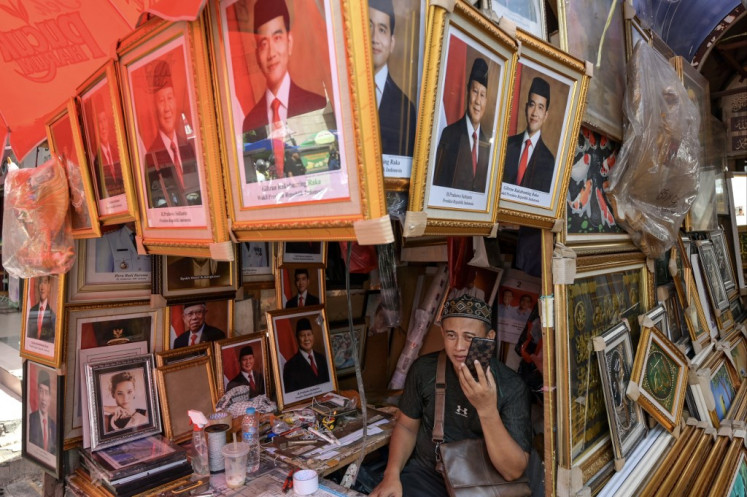Celebrities' repentance: Announcing piety in public
A recent trend in Indonesia’s entertainment industry is celebrities’ hijrah(repentance).
Change Size
 Hijrah, an Arabic word, means migration or journey. (Shutterstock/File)
Hijrah, an Arabic word, means migration or journey. (Shutterstock/File)
A
recent trend in Indonesia’s entertainment industry is celebrities’ hijrah (repentance) in reference to their becoming religious and repenting for their former “less Islamic” ways.
Hijrah, an Arabic word, means migration or journey. In Islamic history it refers to the journey of Prophet Muhammad and his followers from Mecca to Medina to escape the oppression of the dominant Quraish tribe in Mecca. However, the current term in Indonesia refers to an individual’s effort to cast off a lifestyle perceived as un-Islamic and shifting to an “Islamic” code of conduct in behavior and clothes as well as performing all rituals — both obligatory and recommended.
Earlier, and recent examples, include Peggy Melati Sukma, Teuku Wisnu, Irwansyah and Kartika Putri. Many publicly declared their decision to repent from a worldly life and focus more on religious learning. Social media platforms, especially Instagram, have proven to be successful in promoting such conversions.
A famous MTV DJ in early 2000, Arie Untung, for instance, happily announced on his Instagram account his wife’s commitment to cover her head with a hijab.
In general, there are two patterns to such celebrities’ repentance. One sees the individual totally leaving the entertainment industry while in the second, he or she stays in the industry but only accepts jobs believed to be permitted in Islam.
The literalist Salafi school, for instance, believes any performing arts such as singing, dancing and acting are haram. The singer Noor Al-Kautsar or Ucay, the Rocket Rockers’ vocalist, left the band in 2013 and became actively involved in Islamic propagation and businesses.
Others include Sakti (Saktia Ari Seno) of Sheila on 7, who changed his name to Salman al-Jugjawy, Derry Sulaiman, the former guitarist of Betrayer, and Yuki Arifin Martawidjaja or Yuki of the Pas Band.
All of these musicians, who cited their acceptance of hijrah for various reasons including personal tragedies, now, use their music as a tool to attract people to learn more about Islam.
These performers follow an older generation of artists. The late rockers Gito Rollies and Harry Moekti, who recently died, are the best known examples of “artists’ repentance”. Actresses like Astri Ivo and Eva Arnaz also left the film industry and focused on Islamic propagation. What distinguishes the older artists’ hijrah from the younger ones is the public response, especially among their fans armed with new media.
The younger generation of artists publishes their religious intentions on social media, posting and updating activities such as hanging out with fellow repentant artists and organizing religious gatherings that invite famous ustad or ulema.
However, sometimes the changes in their personal choices create controversy, especially if related to values rejected by some followers.
Take the TV show host Rina Nose who decided to wear the hijab but apparently decided to take it off again. Some fiercely criticized her decision, even accusing her of murtad (apostasy).
According to sociologist Bryan Turner, “piety is about the construction of definite and distinctive lifestyles of new religious tastes and preferences”. It can be materialized through many practices: from establishing mosques and wearing the hijab to attending sermons. This piety is not only practiced privately, it can also be promoted through popular culture by celebrities.
Included in this pattern is the emergence of “Islamic music” and “Islamic movies” as well as television programs with more content on Islam. Damai Indonesia (Peaceful Indonesia) on tvOne, Islam itu Indah (Islam is beautiful) on Trans TV and Mamah & Aa on Indosiar are examples of such “pious entertainment”. Such trends can be defined as the pietization of the public sphere, as noted by the scholar Karin van Nieuwkerk.
Personally, I have no problem with this “piety movement” among celebrities. However, when it enters the public sphere, I see at least two problems: first, the artists, who have newly established themselves as students of Islam, may trap themselves in “radical Islam” propaganda due to their lack of knowledge on classical or modern Islamic thought that have various interpretations.
The fact that some of these celebrities support Hizbut Tahrir Indonesia (HTI), now banned for its ideology that is said to be against Pancasila as it promotes an Islamic state, is a clear example. Second, the artists may become easily involved or drawn in to support the politicization of religion.
Aksi Bela Islam 212 (the 212 action to defend Islam) featured many celebrities at the rally, which was seen to be an expression of Muslim solidarity but it turned political with its demands to bring down former Jakarta governor Basuki “Ahok” Tjahaja Purnama who was afterwards jailed for blasphemy.
However, many supporters of the 2016 rallies, including celebrities, apparently thought their involvement was an expression of piety. As public figures they can influence followers to support the politicization of religion.
Nadirsyah Hosen, a scholar at Monash University and chairperson of the advisory board for the Australia-New Zealand branch of Indonesia’s largest Islamic organization Nahdlatul Ulama, said hijrah in the sense of individual shift to deeper piety was a long process. Anyone’s intention to be a better Muslim is good.
However, they cannot just jump from one extreme to another. The best thing is to learn about Islam step by step with pure intention. If renewed “students of Islam” move from one extreme to another, they can easily blame “lesser Muslims” for various issues. The goal of embracing Islam is to have good virtue, not merely changing physical appearance and actions.
***
The writer is a lecturer at the University of Hasyim Asy’ari (Unhasy), Pondok Pesantren (Islamic boarding school) Tebuireng, Jombang in East Java.










